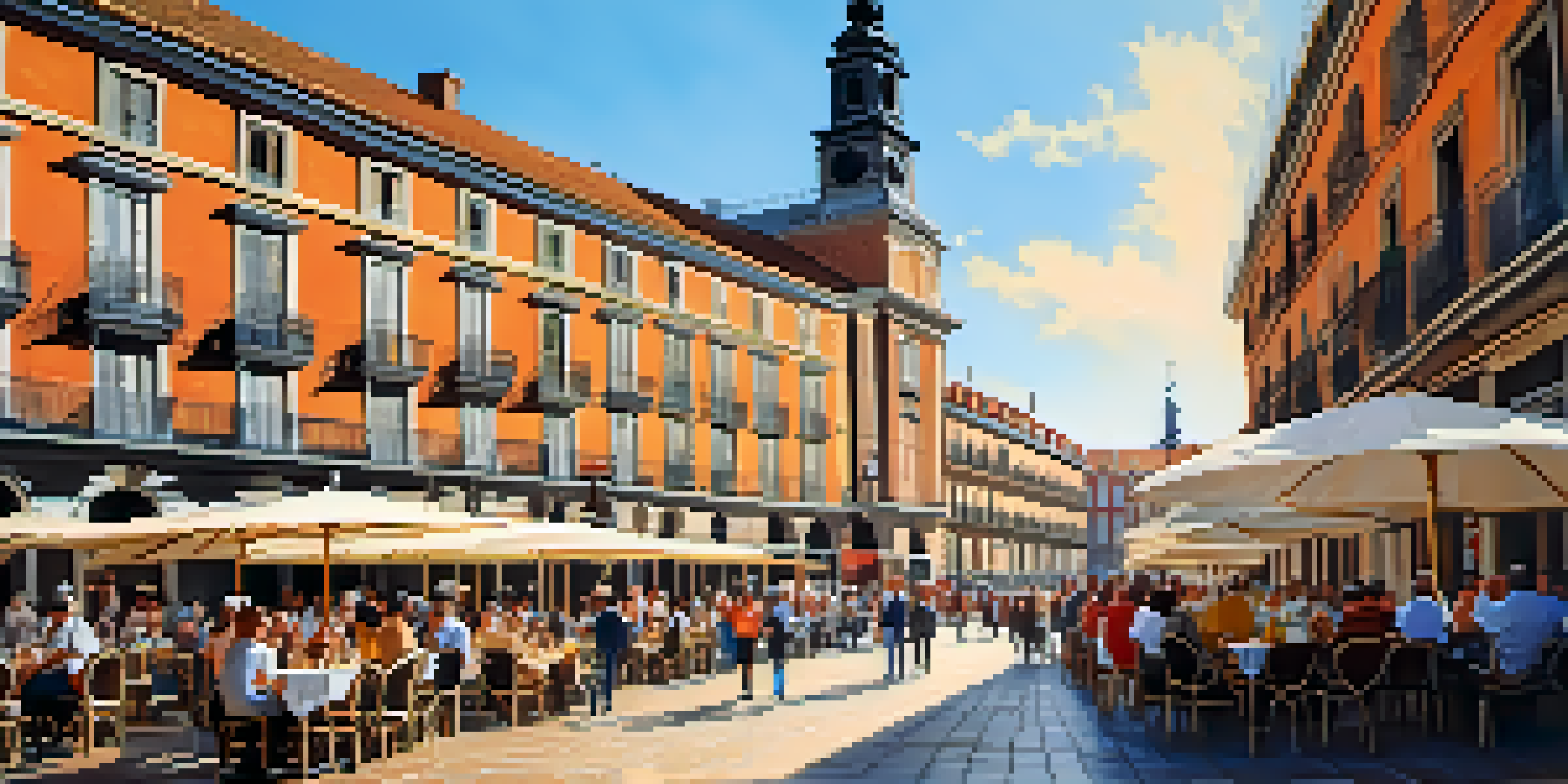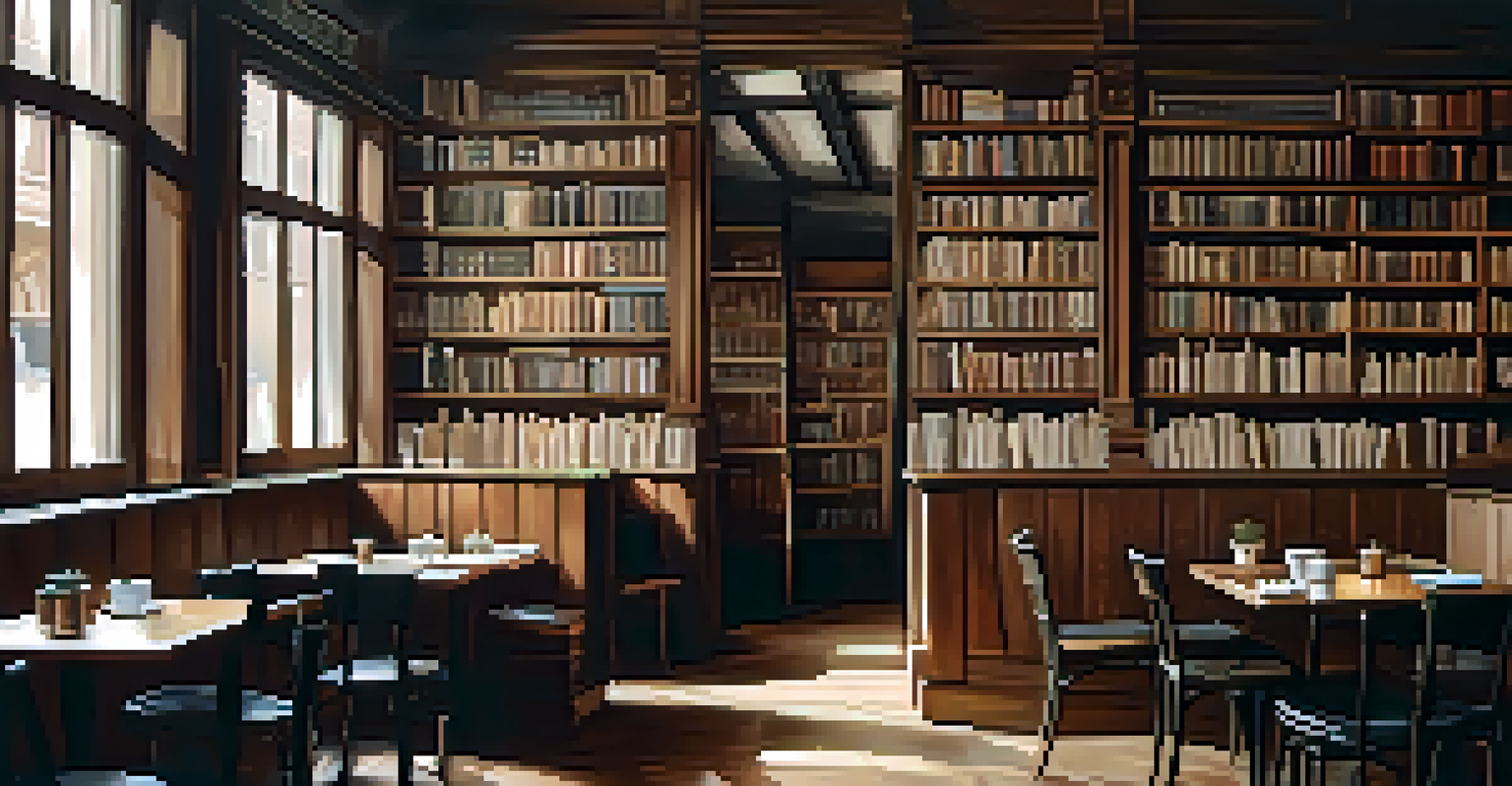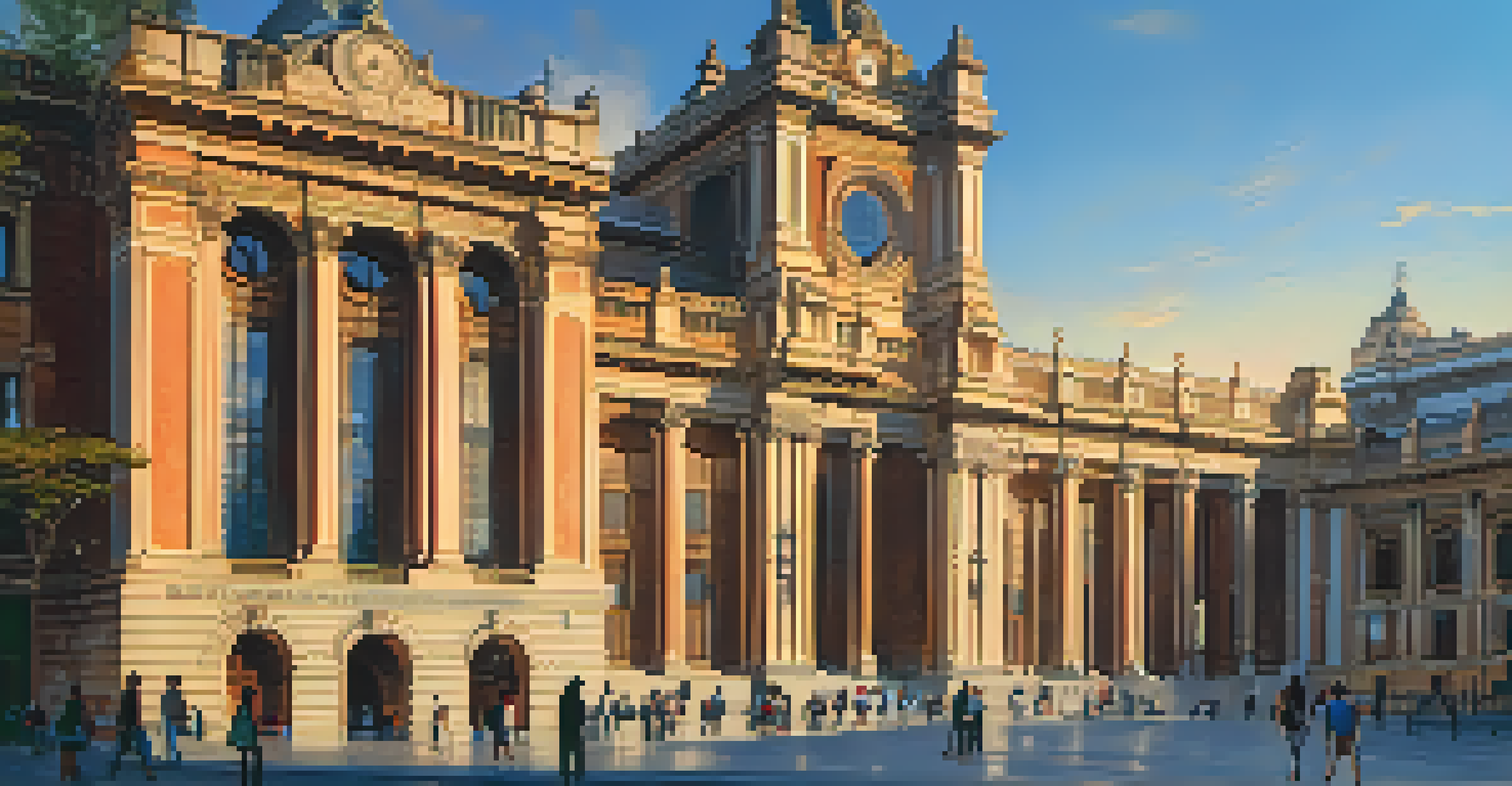Exploring Madrid: The Literary Legacy of Spanish Authors

A Journey Through Madrid's Literary History
Madrid is a city steeped in literary history, where the streets echo with the words of some of Spain's greatest authors. From the Golden Age to contemporary literature, Madrid has been a backdrop for countless stories. It’s not just a place to read about; it’s a living canvas where literature and life intertwine.
The pen is the tongue of the mind.
Walking through the Plaza Mayor, one can almost hear the whispers of literary giants like Miguel de Cervantes, whose influence permeates the city's culture. This historic square was once a hub for artists and writers, making it a fitting starting point for any literary exploration. Just imagine sipping coffee in a café where great minds once gathered!
As you delve deeper into the city, you’ll find that every corner tells a story. Madrid invites you to explore its literary cafes, bookstores, and landmarks, all of which contribute to its vibrant narrative. So, let’s lace up our walking shoes and embark on a journey through the literary heart of Madrid.
Cervantes: The Father of Modern Literature
No discussion of Madrid’s literary legacy would be complete without mentioning Miguel de Cervantes. Often hailed as the father of modern literature, his magnum opus, 'Don Quixote', has influenced countless writers and artists worldwide. His works reflect the complexities of human nature and the struggles of life, making them timeless.

Cervantes' life was as adventurous as his stories, filled with battles, imprisonment, and even the quest for literary recognition. His experiences in Madrid shaped his writing, making the city an integral part of his narrative. You can find tributes to him throughout the city, from statues to dedicated streets.
Madrid: A Literary Hub
Madrid's rich literary history is woven into its streets, showcasing the influence of iconic authors like Cervantes and the vibrant culture of storytelling.
Visiting the Cervantes monument in Plaza de España is a must for any literary enthusiast. It stands not just as a tribute to his genius but also as a reminder of the enduring power of storytelling. Cervantes’ legacy continues to inspire writers and readers alike, inviting them to dream beyond reality.
The Spanish Golden Age: A Flourishing Era
The Spanish Golden Age was a remarkable period that birthed a plethora of literary masterpieces. This era, roughly spanning the 16th and 17th centuries, saw writers like Lope de Vega and Francisco de Quevedo rise to prominence. Their works often tackled themes of love, honor, and the human condition, resonating with audiences then and now.
Literature is the most agreeable way of ignoring life.
Madrid served as a cultural epicenter during this time, attracting playwrights and poets who sought to showcase their talents. The city’s theaters became lively venues for performances, blending literature with entertainment. Imagine the excitement of watching a new play unfold in a bustling tavern, with laughter and applause filling the air!
Exploring the remnants of this era, such as the Teatro Español, allows visitors to connect with the past. These historic venues still host performances, keeping the spirit of Golden Age literature alive. The legacy of this extraordinary period can still be felt today, as Madrid continues to celebrate its rich theatrical heritage.
Contemporary Voices: Modern Spanish Literature
Madrid is not only a city of the past; it also pulses with contemporary literary creativity. Modern Spanish authors such as Javier Marías and Rosa Montero are redefining the literary landscape, bringing fresh perspectives and narratives to readers. Their works often explore themes relevant to today’s society, making literature accessible and engaging.
The city itself inspires these authors, with its vibrant neighborhoods and diverse cultures serving as a rich backdrop for their stories. Many contemporary writers find solace in Madrid’s parks or bustling cafés, where the everyday life of the city fuels their imagination. It’s fascinating how the spirit of Madrid shapes the narratives of its current writers.
Cafés and Bookstores Thrive
The city's cafés and bookstores serve as vital spaces for literary engagement, fostering creativity and community among writers and readers.
Literary festivals and events, such as the Madrid Book Fair, celebrate this modern literary scene, showcasing both established and emerging voices. These gatherings foster a sense of community among readers and writers alike, bridging the gap between generations. Madrid remains a dynamic hub where literature continues to flourish.
Literary Landmarks: A Must-See for Book Lovers
As you wander through Madrid, you’ll encounter numerous literary landmarks that pay homage to the city’s rich history. The Casa de Lope de Vega, for instance, offers a glimpse into the life of one of Spain's most prolific playwrights. This beautifully preserved house invites visitors to step back in time and experience the world of the Golden Age.
Another essential stop is the Biblioteca Nacional de España, home to an extensive collection of literary works and historical documents. This national library not only preserves Spain's literary heritage but also hosts exhibitions that highlight the evolution of literature. Imagine browsing through centuries of literary history right at your fingertips!
Moreover, the iconic Cuesta de Moyano, a street lined with book stalls, is a haven for bibliophiles. Here, you can sift through second-hand books and discover hidden literary treasures. These landmarks and places are not just spots on a map; they embody the spirit of Madrid’s literary legacy.
Cafés and Bookstores: Where Literature Comes to Life
Madrid’s literary scene thrives in its cafés and bookstores, where writers and readers gather to share ideas. Cafés like Café Gijón have a storied history, having hosted famous authors and artists for decades. Picture yourself enjoying a cup of coffee, surrounded by the same vibrant atmosphere that inspired literary greats.
Bookstores, too, play a vital role in Madrid's culture. Places like La Central or Casa del Libro offer not just books but also a sense of community. These spaces often host readings and discussions, making literature an interactive experience. It’s in these cozy corners that literary magic happens!
Legacy of Literary Giants
Literature has shaped Madrid's identity, with neighborhoods reflecting the lives and works of legendary writers, creating a unique cultural tapestry.
By visiting these cafés and bookstores, you’re not just enjoying a drink or browsing for a book; you’re stepping into the heart of Madrid’s literary culture. These venues encourage creativity and connection, inviting everyone to participate in the ongoing dialogue of literature. In a city where stories come alive, these spaces are the pulse of its literary legacy.
The Influence of Literature on Madrid's Identity
Literature has profoundly shaped Madrid’s identity, intertwining with its culture, history, and society. The works of Spanish authors have not only entertained but also sparked discussions about social issues and human experiences. This literary engagement has helped forge a unique identity for the city, one that is rich in diversity and creativity.
Moreover, many neighborhoods in Madrid are intricately linked to specific literary figures or movements. For instance, the Barrio de las Letras honors writers like Cervantes, Quevedo, and Góngora through street names and monuments. Walking through these neighborhoods, you can almost feel the presence of these literary giants breathing life into the streets.

As Madrid continues to evolve, its literary legacy remains a cornerstone of its identity. The city embraces both its historical roots and its contemporary voices, creating a dynamic literary landscape. This vibrant interplay between past and present ensures that literature will always be a fundamental part of Madrid's essence.